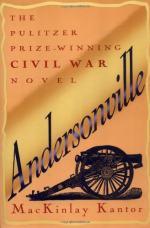It was not much more difficult to dig fifty feet than it had been to dig thirty feet. Davis soon realized this, and put the Dead Line back to twenty feet. His next device was a much more sensible one. A crowd of one hundred and fifty negros dug a trench twenty feet wide and five feet deep around the whole prison on the outside, and this ditch was filled with water from the City Water Works. No one could cross this without attracting the attention of the guards.
Still we were not discouraged, and Andrews and I joined a crowd that was constructing a large tunnel from near our quarters on the east side of the pen. We finished the burrow to within a few inches of the edge of the ditch, and then ceased operations, to await some stormy night, when we could hope to get across the ditch unnoticed.
Orders were issued to guards to fire without warning on men who were observed to be digging or carrying out dirt after nightfall. They occasionally did so, but the risk did not keep anyone from tunneling. Our tunnel ran directly under a sentry box. When carrying dirt away the bearer of the bucket had to turn his back on the guard and walk directly down the street in front of him, two hundred or three hundred feet, to the center of the camp, where he scattered the sand around—so as to give no indication of where it came from. Though we always waited till the moon went down, it seemed as if, unless the guard were a fool, both by nature and training, he could not help taking notice of what was going on under his eyes. I do not recall any more nervous promenades in my life, than those when, taking my turn, I received my bucket of sand at the mouth of the tunnel, and walked slowly away with it. The most disagreeable part was in turning my back to the guard. Could I have faced him, I had sufficient confidence in my quickness of perception, and talents as a dodger, to imagine that I could make it difficult for him to hit me. But in walling with my back to him I was wholly at his mercy. Fortune, however, favored us, and we were allowed to go on with our work—night after night—without a shot.




